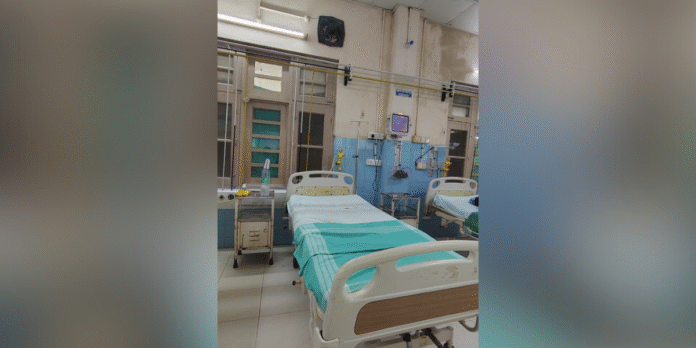Concerns have been raised over hygiene practices at GB Pant Hospital, the only tertiary care facility in the Andaman and Nicobar Islands, following a witness account that pointed to lapses inside the Intensive Care Unit (ICU).
According to the account, a patient was shifted out of the ICU due to a shortage of beds, and another patient was admitted to the same bed shortly afterward. The witness alleged that the bed linen was not changed immediately but was instead adjusted before the new patient was accommodated. In the interest of patient privacy, The Wave Andaman is withholding the identities of both the patient and the witness.
GB Pant Hospital serves as the primary referral hospital for over four lakh residents across the islands. The hospital is regularly stretched by high patient loads and constrained resources, with shortages of beds and critical care facilities being longstanding challenges. The ICU, in particular, caters to some of the most vulnerable patients, for whom even small lapses in hygiene can carry significant risks.
Healthcare delivery in the islands faces structural limitations that are distinct from those on the mainland. The isolation of the territory means that patients requiring specialised treatment often have to be referred to Chennai or Kolkata, which involves delays and imposes additional financial burdens on families. The Wave Andaman has previously reported on how several mainland hospital chains, particularly those based in Chennai, operate satellite clinics in the islands that primarily serve as referral points, directing patients to higher-cost treatment at their central hospitals.
The hygiene concerns flagged at GB Pant highlight the risks of hospital-acquired infections (HAIs), a major global challenge that continues to strain public health systems. HAIs are infections contracted during hospital stays, and studies in India have shown that their prevalence in intensive care units is higher than the global average. Factors contributing to this include overcrowding, shortages of trained healthcare staff, and limited infection-control infrastructure.
The Indian Council of Medical Research (ICMR) has repeatedly underlined the seriousness of HAIs, describing them as a leading cause of prolonged hospitalisation, increased medical costs, and fatalities among critically ill patients. In ICUs, where patients are already vulnerable, strict adherence to infection-control protocols such as regular linen changes, sterilisation of equipment, and hand hygiene are considered essential safeguards. Any deviation from these practices increases the risk of infections spreading rapidly within critical units.
In the Andaman and Nicobar Islands, the issue is compounded by resource scarcity. Annual allocations by the health department cover hospital maintenance, procurement of medical supplies, and patient services. Yet patients and attendants frequently raise concerns over the adequacy of these provisions. Complaints often centre on the availability of beds, specialised care, and support services, reflecting the wider strain on the public healthcare system.
The witness account of bed linen not being changed between ICU patients points to a potential breach of basic hygiene norms. While such practices may arise from immediate pressures caused by shortages of beds and staff, they also underscore systemic vulnerabilities that can have severe consequences for patient safety.
So far, no official response has been issued in connection with this particular incident. Without clarification, questions remain about the consistency of hygiene protocols at the hospital and whether adequate oversight mechanisms are in place to ensure adherence. For families relying on GB Pant Hospital as the last line of care in the islands, such accounts intensify anxieties about the safety and reliability of treatment.
As the islands continue to grapple with the dual pressures of growing demand and limited infrastructure, the challenge for the administration will be to ensure that critical facilities like the ICU maintain the highest possible standards of hygiene and patient safety. The absence of alternatives within the territory makes this imperative not just for the credibility of the health system but also for the well-being of residents who depend entirely on it.





